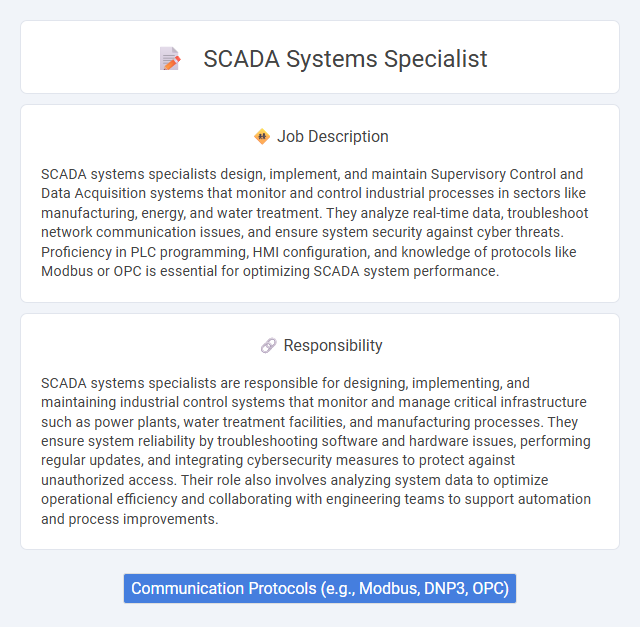
SCADA systems specialists design, implement, and maintain Supervisory Control and Data Acquisition systems that monitor and control industrial processes in sectors like manufacturing, energy, and water treatment. They analyze real-time data, troubleshoot network communication issues, and ensure system security against cyber threats. Proficiency in PLC programming, HMI configuration, and knowledge of protocols like Modbus or OPC is essential for optimizing SCADA system performance.
Individuals with strong analytical skills and a keen attention to detail are likely suitable for a SCADA systems specialist role, given the technical and monitoring demands of the job. Those who thrive in environments requiring problem-solving under pressure may find this career aligns well with their abilities. Conversely, people who prefer routine tasks or lack technical interest might find the complexities and real-time troubleshooting aspects challenging.
Qualification
SCADA systems specialists require a strong foundation in electrical engineering or computer science, often supported by a relevant bachelor's degree. Proficiency in industrial automation, PLC programming, network security, and real-time data analysis is essential for effective system design and troubleshooting. Certifications such as ISA Certified Automation Professional (CAP) or specific SCADA vendor credentials enhance a specialist's qualifications and career prospects.
Responsibility
SCADA systems specialists are responsible for designing, implementing, and maintaining industrial control systems that monitor and manage critical infrastructure such as power plants, water treatment facilities, and manufacturing processes. They ensure system reliability by troubleshooting software and hardware issues, performing regular updates, and integrating cybersecurity measures to protect against unauthorized access. Their role also involves analyzing system data to optimize operational efficiency and collaborating with engineering teams to support automation and process improvements.
Benefit
SCADA systems specialists likely benefit from high demand in industries such as manufacturing, energy, and utilities, improving job stability and career growth opportunities. Expertise in SCADA may lead to competitive salaries and specialized skill development, enhancing long-term employability. The role probably offers the chance to work with cutting-edge technology, fostering continuous learning and professional advancement.
Challenge
SCADA systems specialists likely face complex technical challenges involving the integration and maintenance of industrial control systems to ensure real-time data accuracy and system reliability. They may encounter difficulties in diagnosing faults within diverse hardware and software environments, requiring advanced problem-solving skills. The probability of needing to adapt quickly to evolving cybersecurity threats also presents a significant ongoing challenge in this role.
Career Advancement
SCADA systems specialists play a critical role in monitoring and controlling industrial processes, offering expertise in system design, integration, and troubleshooting. Career advancement opportunities include progressing to senior control systems engineer, SCADA project manager, or automation consultant roles, often requiring proficiency in PLC programming and cybersecurity. Gaining certifications such as ISA/IEC standards and experience with IoT integration significantly enhances prospects in this rapidly evolving field.
Key Terms
Communication Protocols (e.g., Modbus, DNP3, OPC)
SCADA systems specialists must possess in-depth knowledge of communication protocols such as Modbus, DNP3, and OPC to ensure efficient data exchange between control devices and central monitoring systems. Mastery of these protocols enables seamless integration, real-time monitoring, and reliable command execution across diverse industrial automation networks. Proficiency in troubleshooting protocol-specific issues and optimizing communication performance is critical for maintaining system stability and security.
 kuljobs.com
kuljobs.com